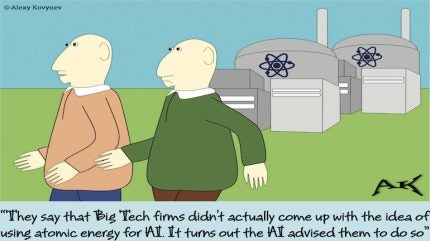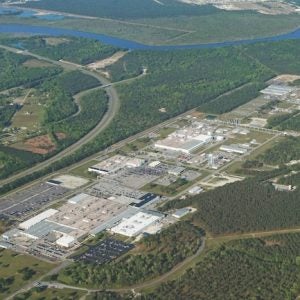
A wave of recent Big Tech company announcements reveals they have apparently committed en masse to nuclear energy and started openly investing in advanced nuclear developers. What started as a trickle quickly became a flood as Google has signed power purchase agreements with Kairos that will support the future development and commercialisation of its KP FHR design, a TRISO- fueled molten salt technology; Amazon, alongside some partners, decided to invest approximately $500 million into X-energy and to support the initial project in central Washington. The companies aim to bring as much as 5 GW online by 2039; Microsoft has signed a 20 year power purchase agreement with Constellation Energy, which will lead directly to the restart of Three Mile Island unit 1; even Apple quietly changed its environment statement to now recognise nuclear as ‘clean’ energy. The scale of Big Tech interest has not just benefited the nuclear companies listed, but appears to have lifted all boats – with both NuScale and Oklo noting very significant share price rises.
The emergence of AI and the massive projected expansion of demand for 24-7 high-quality electricity, has arguably achieved for the global nuclear industry what decades of climate catastrophism and even a global energy crisis has not – broad acceptance of the centrality of nuclear energy in the low-carbon, resilient future energy system. Governments have (by and large) been convinced on the importance of nuclear energy for years, but now industry is really beginning to get onboard.
Of course, these are not the first such expressions of support and investment from other industries. Major companies in the chemicals, steel and maritime sectors have made similar plans and commitments. However, there is something about the sheer size and centrality of Big Tech that makes this development impossible to ignore. People around the world will have seen the news, and if they had never given two thoughts about nuclear energy previously, they will have done so now.
That other notable recent announcement, where 14 global financial institutions expressed their willingness to back the nuclear industry in reaching its 3X goal, shows just how much acceptance of nuclear energy has improved. What has emerged in the last month or so is a global private sector consensus on the importance of nuclear energy for the low-carbon energy transition.
One nuclear financing expert shared the view that these announcements mark the start of a super-cycle of investments into the nuclear sector. Massive financing flows from multiple sources have finally been unlocked and will increasingly be directed into technology and project development.
The 2011 Fukushima Daiichi nuclear accident marked a clear low point for industry prospects and effectively spelt the end of what was then widely referred to as the global nuclear renaissance. The public sentiment and prospects for nuclear energy has gradually recovered since then, but nothing has prepared us for the rapid acceleration we are seeing now. This feels like a genuine turning point.
Those remaining (and increasingly isolated) anti- nuclear enclaves are surely floundering. One wonders how Australian energy minister Chris Bowen will reconcile these announcements with his party’s position that nuclear energy is just too difficult for the country. Does this mean Australia is bound for technological obscurity, perhaps? How will Taiwanese politicians continue to justify a nuclear phase out, even as their companies supply the chips that Big Tech relies on? The mental gymnastics are going to be fascinating to watch.
Online nuclear sceptics have also struggled to find a coherent reaction. For example, on X, Tyler Norris bounced from trying to pour cold water on both the timeframes and amounts of the investments to interpreting them as a bad sign for further large light water reactors in the USA. Positive nuclear news never seems to be quite positive enough for some people.
Also on X and earlier in the month, David Roberts cheerily offered to wager $100 with Jigar Shah – the director of the US Loans Progamme Office – that no tech company would build a nuclear plant next to their data centre by 2040. Two weeks later and barely pausing to wipe the egg from his face, Roberts quipped that everything is in place for SMRs except the SMRs themselves. He lamented that the reason Big Tech companies are making these investments now is apparently because the US government failed to expand the grid fast enough. Because of course that was always going to be a trivial undertaking.
What the renewable advocates/nuclear critics fail to acknowledge is that the Big Tech companies all started from positions of incredibly strong support for wind and solar – most or all having embraced 100% renewables targets. They are now getting even more serious with their climate commitments and that has essentially forced them to embrace nuclear and other reliable low-carbon energy technologies as they grapple with the practical realities of reaching zero climate emissions. A zero-emissions target is an order of magnitude harder than net-zero emissions, since it no longer allows companies to hide their emissions behind offsets.
Another blow to the climate orthodoxy is just how wrong many of the climate-focused energy scenarios have turned out to be. Any scenario which projects a decline in energy consumption per capita has been revealed as naively optimistic, or heavily influenced by Malthusian ideology. Baked into the assumptions is the idea that humans would never again come up with civilization-transforming energy intensive innovations, or perhaps that governments would ban any that sprang forth. Going forward all such scenarios should clearly be understood to be academic thought-experiments only. For the most part we can be glad that these researchers were wrong.
There are indeed genuine questions to address regarding what constitutes moral types and levels of energy use. It seems that AI has passed this test for now, or at least that political leaders are either incapable or unwilling to stop it. AI feels both more inevitable and more transformative than Bitcoin, that other digital invention or recent years that promised to smash demand records.
In any case, the nuclear industry’s job is simply to meet customer demand, not to question it. Others will have to determine whether AI is fundamentally beneficial to humanity or not.
As for whether these advanced nuclear announcements spell the end of large water-moderated reactors, that is very unlikely given the substantial national programmes that remain on the books. Most of the tech companies seem supportive of big beautiful reactors, and Microsoft explicitly so. If the Big Tech companies won’t support new additional large reactors directly, then national governments will. These have not been absolved of their duty to ensure public energy supply.
Rather, these deals and investments represent a welcome spur to the advanced nuclear sector and suggest strongly that the window of nuclear energy applications will be larger in the future than they are today.
May every month going forward be as good.






